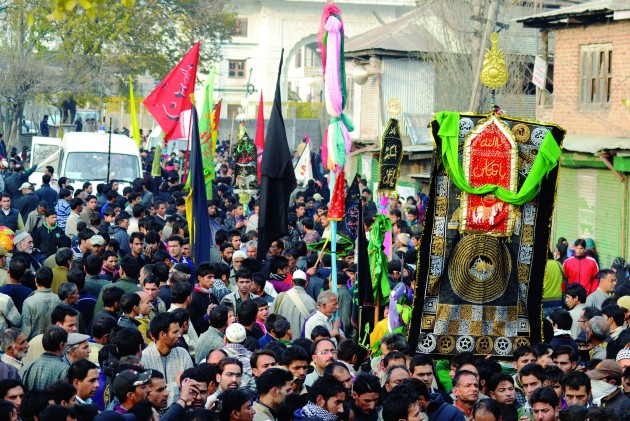
Syed Zafar Mehdi
It’s that time of year again when the campaigners of truth and justice, cutting across ethno-sectarian and ideological lines, rally to pay homage to the ‘master of the martyrs’, a 7th century revolutionary historical figure who redefined the ideas of resistance and resilience on the desert plains of Karbala (Iraq) 1400 years ago. The uprising and martyrdom of Imam Hussain (as), the beloved grandson of Prophet Mohammad (pbuh), in 61 hijri (680 AD) arguably has no parallel in the annals of history. To invoke poet Sir Mohammad Iqbal (ra), “he watered the dry garden of freedom with the surging wave of his blood, uprooted the despotism and awakened the slumbering Muslim nation”.
Hussain ibn Ali’s (as) uprising against Yazid ibn Muawiya was not a struggle for power or one-upmanship; it was a confrontation between truth and falsehood, just and unjust, blood and sword. In the battle of Karbala, blood triumphed over the sword. Hussain (as) and 71 companions fought against Yazid and his 30,000 strong army. Hussain (as) had made it clear that he will not pledge allegiance to a despot like Yazid. In Maqtal al-Hussain by Al-Khwarizmi Hanafi, it is mentioned that when Waleed ibn Uqbah, the governor of Medina, summoned Imam Hussain (as) to swear allegiance to Yazid, he refused. “A person like me cannot give the pledge of allegiance to a person like him,” Hussain (as) said.
Through these annual Muharram commemorations, the people of conscience reaffirm their pledge to the sacrosanct principles exemplified by Hussain (as) in Karbala. It strengthens their resolve to speak truth to power, like Hussain (as) did in Karbala and his sister Zainab bint Ali (sa) did in the aftermath of Karbala. Its message is timeless and resonates even today, with tremendous clarity, inspiring truth-seekers and the advocates of human rights across the world. In Ziyarat e Ashura, we beseech Allah to “provide us an opportunity to fight for justice…” That’s the legacy of Karbala.
The tradition of azadari, commemoration of the events related to Karbala, which is essentially a universal protest of oppressed against oppression, began soon after the tragedy of Karbala when the members of Holy Prophet’s (pbuh) household, including Sayyeda Zainab (sa), Sayyeda Umme Kulsoom (sa) and Imam Zainul Abideen (as), were released from Yazid’s prison in Damascus and sent back to Medina.
The first marsiya, a poetic elegy for the martyrs of Karbala, was composed and recited by Umme Kulsoom (sa), the sister of Hussain (as), in Medina.
What is the significance of azadari? In the words of Imam Jafar Sadiq (as), a great scholar of Islam, it is the means of keeping alive the movement started by Imam Hussain (as) in the desert plains of Karbala. The movement, which has gripped the hearts and minds of people for fourteen centuries, continues today in Kashmir, in Palestine, in Syria, in Iraq, in Yemen, in Bahrain, in Afghanistan. Understanding the purpose of Hussain’s (as) uprising is essential to understand the philosophy of Karbala and the significance of these annual commemorations.
“Every revolution”, says Iranian sociologist Dr. Ali Shariati, “has two visages: blood and the message. Hussain (as) and his companions undertook the mission of blood. The second and equally important mission is to carry the message of this blood to future generations.” That is essentially the objective of Azadari and these annual Muharram commemorations.
The first marsiya, a poetic elegy for the martyrs of Karbala, was composed and recited by Umme Kulsoom (sa), the sister of Hussain (as), in Medina. Ummul Baneen (sa), the mother of Abbas ibn Ali (as), played a pivotal role in making the practice popular in Medina by writing some heart-rending marsiyas. Those marsiyas, according to historical accounts, jolted people out of slumber and laid bare the evil machinations of Umayyad rulers. These are the women of Karbala, who toppled a powerful empire with their spoken and written word.
When Yazid was informed by Marwan bin Hakam, his close aide, about these mourning gatherings in Medina, he feared public mutiny and ordered the re-arrest of Imam Zainul Abideen (as), the ailing son of Hussain (as) and the only surviving male member of the holy household. That forced the caravan to move back to Damascus. But, notwithstanding the hegemonic diktats of Yazid and his coterie, the insurrection caused by the martyrdom of Hussain (as) and his companions was kept alive through azadari in Medina, followed by other places.
The importance of the role played by Zainab bint Ali (sa), the sister of Hussain (as), in the aftermath of Karbala to keep the institution of azadari alive cannot be emphasized enough. The ‘messenger of Karbala’, a model of defiance against injustice and oppression, shook the foundation of Yazid’s empire with her soul-stirring marsiyas and sermons. When she confronted Yazid in his Damascus palace, there was a stunned silence. “I swear by Allah that I do not fear anyone but Him and do not complain to anyone but Him,” said the daughter of Ali ibn Abi Talib (as). “You may employ your deceit and shrewd tactics, but I swear by Allah that the shame and ignominy you have earned for yourself by the treatment meted out to us cannot be erased.” That is exactly what happened as the word spread and a mighty empire of Yazid was razed to ground.
In 352 hijri, the first Muharram procession was taken out in Baghdad by then Abbasid ruler Mu’tazz Daulah. Almost 11 years later, on the occasion of Arbaeen (the fortieth day after Ashura), a historic procession was taken out from Baghdad to Karbala. In 423 hijri, first zuljanah procession was taken out in Kufa by the members of Banu Assad clan. Many similar processions were later taken out in Baghdad, Iran and India. In India, Muharram processions were first taken out in Awadh (present day Lucknow), almost 200 years ago, under the patronship of the Nawabs of Awadh. Mirza Abul Qasim, a legendary marsiya nigaar of Kashmir, had travelled all the way to Awadh on the invitation of Nawab Wajid Ali Shah.
The importance of the role played by Zainab bint Ali (sa) in the aftermath of Karbala to keep the institution of azadari alive cannot be emphasized enough
In Hyderabad, during the reign of Nizams, both Muslims and non-Muslims would participate in these processions. From quiet ceremonies inside crammed hallways to huge street processions, azadari over a period of time became synonymous with the cry of oppressed and revolt against the oppressor.
Imam Zainul Abideen (as), as an eyewitness of Karbala, played a key role in establishing the institution of azadari and conveying the message of the martyrs. His descendants kept the tradition alive. They would invite prominent poets to write and recite elegiac poetry in the honor of the martyrs of Karbala. Once Imam Zainul Abideen (as) went to Mecca for the Hajj pilgrimage. Hasham bin Abdulmalik bin Marwan, the Khalifa (ruler) of that time, was also present there. Khalifa tried hard to touch Hajrul Aswad (black stone in the eastern corner of Kaabah) but was unable to make his way through the crowd. In the meantime, a young man walked in. When he approached Hajrul Aswad, the crowd immediately dispersed. The Khalifa, who was watching the spectacle, was taken aback. He knew the young man but when someone asked him, he feigned ignorance. Furuzduq came forward and recited a beautiful poem, eulogizing the Imam and his household. The poet was immediately arrested.
Imam Mohammad Baqir (as), during his time, gave further impetus to the practice of azadari. He was followed by Imam Jafar Sadiq (as), who invited the famous poet Jafar Affan to recite marsiyas. During this time, Umayyads and Abbasids were busy fighting for the crown, so Imam Jafar Sadiq (as) had ample time and freedom to enlighten people about the philosophy of Imam Hussain’s uprising in Karbala.
During the time of Imam Musa Kazim (as), some changes were introduced to marsiya nigaari. He asked the poets of that time to write in their respective languages as per their own linguistic and cultural traditions.
In Kashmir, the history of annual Muharram commemorations is remarkable. People have offered blood, sweat and tears to keep the tradition of azadari alive. According to many historians, azadari in Muharram was popularized in Kashmir by Mir Syed Ali Hamdani (ra), the great Sufi saint who came to Kashmir from Iran. A staunch lover of Holy Prophet (as) and his progeny, he is believed to have brought many tabarrukaat (symbols of heritage) from Karbala. Before his time, Kashmiri nauhas and marsiyas were heavily laden with Sanskrit words. The popularity of Persian nauhas in Kashmir is largely attributed to him.
According to historians, azadari in Muharram was popularized in Kashmir by Mir Syed Ali Hamdani (ra), the great Sufi saint who came to Kashmir from Iran
Barely 10 years after Shah e Hamdan (ra) passed away, Syed Mohammad Madni arrived in Kashmir and settled in Ahmedpora. His contribution was commendable, so was the role played by Syed Hussain Qommi, who came from Iran and settled in Zainageer Sopore. Then came the time of Mir Shamsuddin Araqi (ra), during which the practice of azadari became widespread in Kashmir. He came to Kashmir twice. The first time as a government-appointed envoy from Iran and second time to provide spiritual guidance to people. This was during the reign of Shahmiri dynasty when Qazi Chak was the Prime Minister. Until that time, people used to do azadari inside bungalows owned by Shia aristocrats. He built Khanqah in Zadibal where he started to hold azadari majalis (ceremonies) during the month of Muharram.
The first marsiya, a blend of Kashmiri and Sanskrit, was composed by Mir Syed Hassan during the Shahmiri dynasty rule in 822 hijri. It was the language of Sheikh ul Alam Nooruddin Noorani. During the Chak rule, Kashmiri marsiyas gained unprecedented prominence. However, during the Afghan rule, marsiya nigaars were forced to go underground. Mourning ceremonies were organized mostly at night time and marsiyas were composed and recited clandestinely. In 1180 hijri, Khwaja Hussain Mir broke a new ground in Kashmiri marsiya nigaari. He revived the art and divided a marsiya into five parts – hamud, dumbaal, gath, kreakh, nishast.
Hakim Mohammad Azeem of Habakadal later gave a new pattern to Kashmiri marsiyas, which includes barkhaast, godich gaah, dumbaali, kreakh, patim gaah, naram and nishast. After him came Mirza Abul Qasim toward the end of Sikh rule and before Dogra rule. He built an Imambarah and used to recite Kashmiri marsiyas there. After him came Munshi Mohammad Yusuf and Munshi Mustafa, both of whom collaborated to pen down many popular Kashmiri marsiyas.
Keeping the Karbala movement alive, though, has come at a cost. The lovers of Ahlulbayt (as) in Kashmir have been persecuted by rulers and their lackeys throughout history. They were attacked and looted almost 21 times and the shrine of Mir Shamsuddin Araqi (ra) was set ablaze at least nine times. That partly explains why mourning ceremonies were held mostly inside packed halls, at night, till the time of Sheikh Mohammad Abdullah. During his time, a zuljanah procession was taken in day time from Namchibal to Zadibal Imambarah, led by Mirza Mohammad Ali, and another procession from Alamgiri Bazar to Khushalsar. At his request, it was decided to take out a joint procession from Abi Guzar to Zadibal, in which both Shias and Sunnis participated.
The first marsiya, a blend of Kashmiri and Sanskrit, was composed by Mir Syed Hassan during the Shahmiri dynasty rule in 822 hijri
In 1989, the procession was banned and the ban remains in place. Government justifies the ban saying these processions pose ‘law and order problem’, although the processions are completely peaceful in nature. This year, like every year, mourners were brutally manhandled by police personnel after they took out a Muharram procession in Dalgate Srinagar. They termed the police action as blatant breach of their religious freedom.
The institution of azadari could not be obliterated by Yazid of that time and it cannot be obliterated by Yazids of today. The tyrant always seeks to hide his tyranny. The campaigners of truth and justice commemorate Karbala through azadari to keep the movement alive, so that people know who killed whom and why. When people know facts, they will hate the tyrant and his tyranny. That is precisely why sympathizers of these tyrants oppose the practice of azadari, to hide the oppression unleashed on the oppressed.
Author is a journalist who divides his time between Kashmir, Kabul and New Delhi. He tweets at @mehdizafar
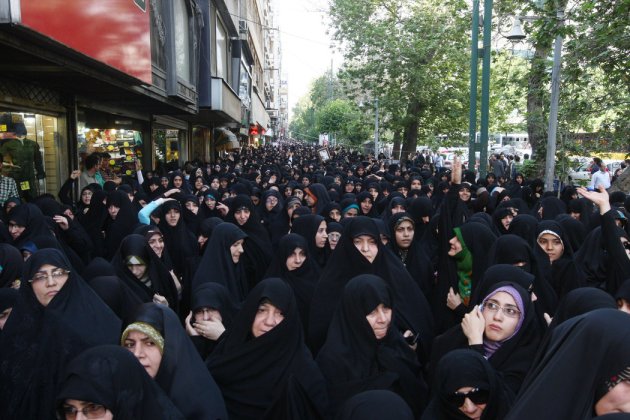
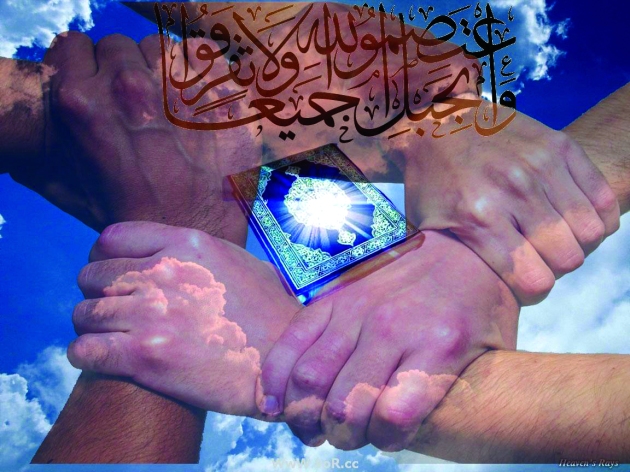

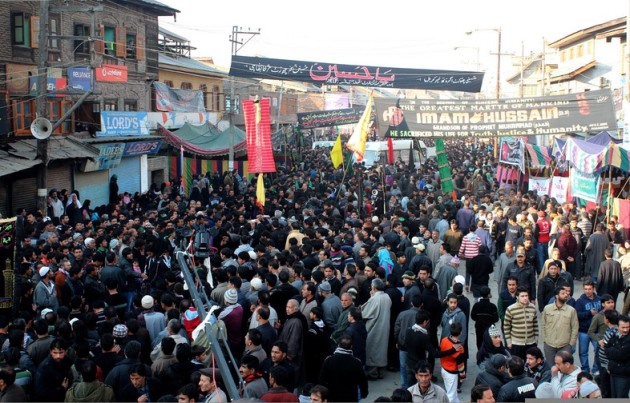




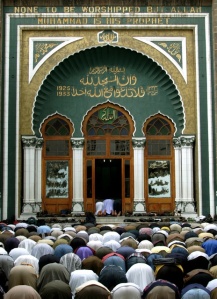



Recent Comments